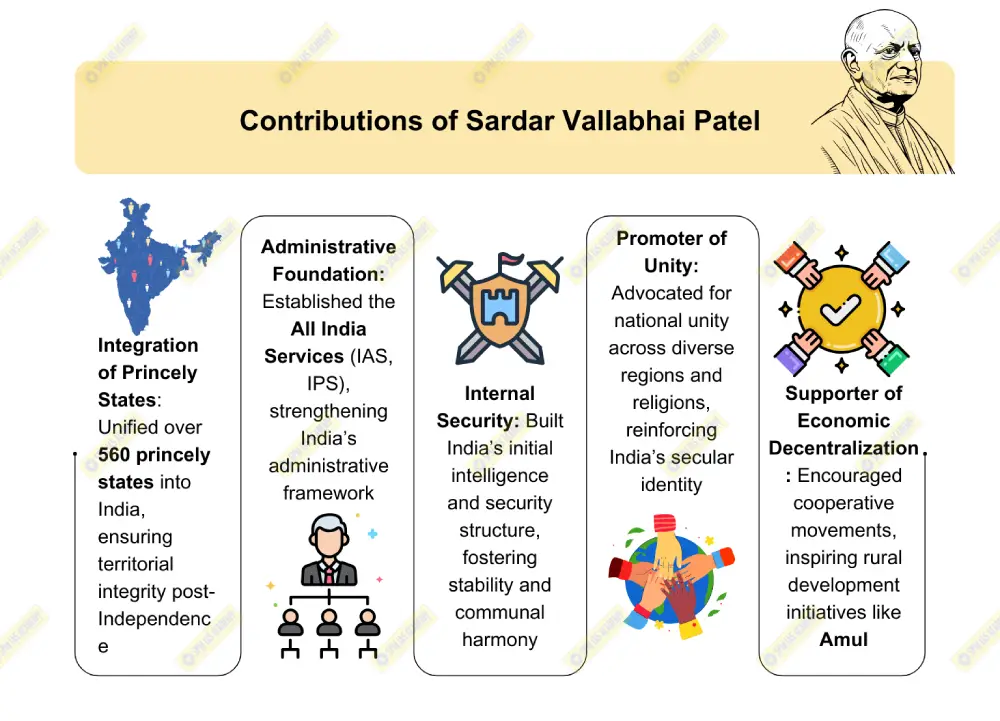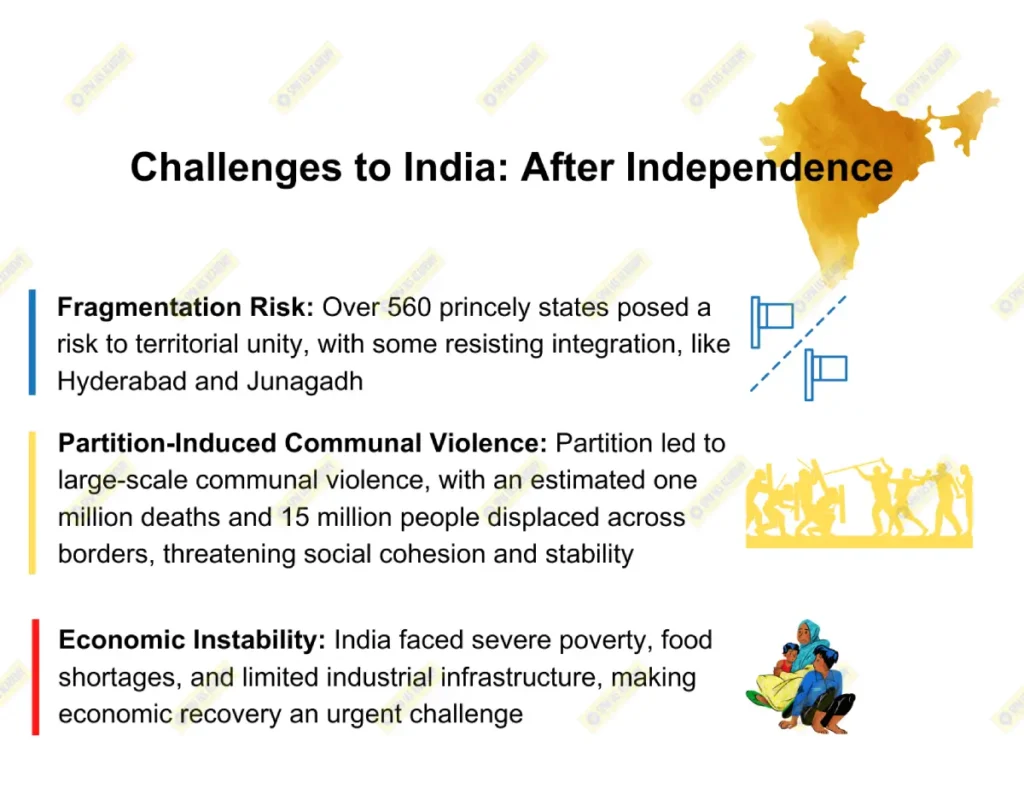Sardar Vallabhbhai Patel’s contributions were foundational in consolidating and strengthening the Indian nation-state post-Independence. Known as the “Iron Man of India,” Patel’s efforts spanned political integration, administrative reforms, and nation-building, laying the bedrock for India’s unity and governance framework.
1. Territorial Integrity
Patel’s most monumental achievement was the integration of over 560 princely states into the Indian Union, ensuring India’s geographic and political cohesion. At the time of Independence, these states had the option to join India, Pakistan, or remain independent, posing a potential threat to national unity. Patel’s use of diplomacy and force, when necessary (as in Operation Polo for Hyderabad in 1948), prevented fragmentation. Reflecting on the importance of territorial integrity, Patel remarked, “There is something unique in this soil, which despite many obstacles has always remained the abode of great souls.”
2. Sovereignty and Political Authority
As India’s first Deputy Prime Minister and Home Minister, Patel strengthened the internal sovereignty of the nation by bringing princely states under a single administration, thus consolidating the central government’s authority. By incorporating various autonomous territories into the Union, he reinforced India’s sovereignty and unified the nation politically, creating a centralized governance model that reduced fragmentation risks.
3. National Identity and Cultural Unity
Patel emphasized “unity in diversity”, promoting a unified Indian identity that transcended regional and cultural differences. He famously said, “Manpower without unity is not a strength unless it is harmonized and united properly; then it becomes a spiritual power.” Patel’s vision was to foster national unity by promoting loyalty to India over regional affiliations. This idea of unity amidst diversity continues to define India’s identity today, helping bridge its vast cultural and linguistic divides.
4. Centralized Governance and Administrative Structure
Recognizing the need for administrative stability, Patel was instrumental in establishing the All India Services (IAS and IPS), which he termed the “steel frame” of India. He believed that a centralized civil service would provide cohesion and continuity across states, noting that “you will not have a united India if you do not have a good all-India service which has independence to speak out its mind.” These services formed the backbone of Indian administration, promoting efficiency and stability in governance nationwide.
5. Legal and Judicial Framework
Patel’s integration of princely states also unified diverse legal systems under one national judiciary and administrative system, essential for maintaining rule of law across India. This helped establish a standardized legal framework, fostering a cohesive judicial and legal system that respected India’s Constitution and the rights of all citizens, regardless of their former princely affiliations.
6. Economic Systems and Fiscal Policies
While Patel was not directly involved in economic planning, his efforts in territorial unification and administrative cohesion laid the groundwork for India’s economic development. By creating a stable and unified nation, he provided the security and framework necessary for economic policies and fiscal strategies, enabling India to begin organized economic development under the Planning Commission.
7. Social Welfare and Public Services
Patel’s integration efforts extended access to public resources and social services across the newly incorporated states, creating a more inclusive nation. This approach reflected his commitment to ensuring that people in former princely states could access the same social and welfare services as other Indian citizens, thereby supporting India’s socio-economic integration.
8. Military and Defense Capabilities
Patel understood the importance of internal and external security for a stable nation. His decisive use of military intervention in Hyderabad, as part of Operation Polo, demonstrated his commitment to safeguarding national integrity. His work in unifying the police and intelligence services laid the foundation for a robust internal security framework, necessary for a secure and resilient nation-state.
9. Diplomatic and International Relations
Although Patel focused primarily on internal affairs, his unification efforts projected India as a stable, consolidated entity, strengthening India’s position on the international stage. His commitment to a unified India laid the groundwork for strong diplomatic relations, ensuring that India could engage globally as a cohesive and stable nation-state.
10. Citizenship and Rights
Patel’s policies promoted equal rights for all citizens, including those from former princely states, establishing a common national citizenship. His efforts to integrate diverse territories ensured that people across India shared the same legal rights, fostering national loyalty and unity while reinforcing the bond between the state and its citizens.
Sardar Vallabhbhai Patel’s contributions were pivotal in establishing each essential aspect of the Indian nation-state. His work in securing territorial integrity, promoting a unified administrative framework, fostering a national identity, and prioritizing internal security laid a stable foundation for India’s future. Through his visionary leadership, Patel reinforced the idea of a strong, inclusive India, where diversity is embraced within a unified national identity. His legacy as the “Iron Man” and the architect of Indian unity endures as a reminder of the critical role unity, integrity, and effective governance play in building a resilient nation.













